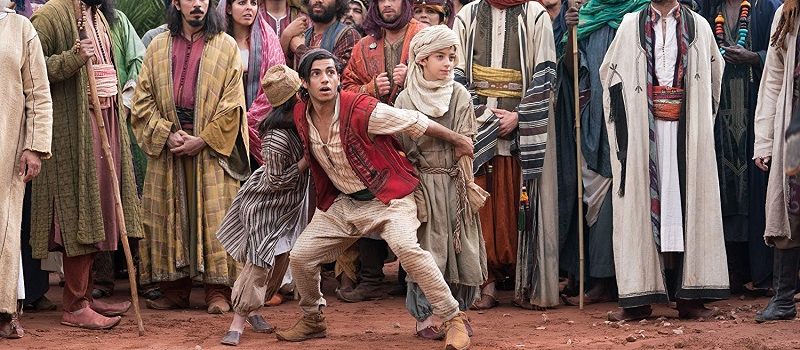Guy Ritchie can scratch two things off his “I’ve never” list with the arrival of his latest film, Aladdin. The Snatch filmmaker can no longer say he’s never directed a Disney film and he can no longer say he’s never helmed a musical. So, how did one of my favorite filmmakers do with his live action version of one of Disney’s most beloved animated treasures?
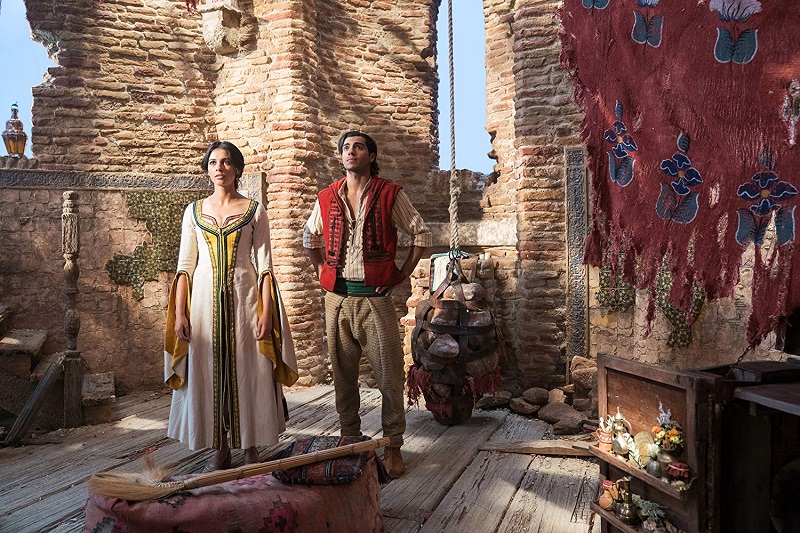
First, Aladdin is the least “Guy Ritchie” Guy Ritchie movie that he’s ever made. That being said, it still feels like a film in his canon, thanks to a huge “tell” in his style. Remember those chase scenes in the bazaar in the 1992 Robin Williams as the Genie breakout smash? Given that they were animated, artists made them as thrilling as could be, given the technology of the time. With this live action remake, Ritchie achieved something extraordinary in that his chase through the streets of Agrabah is pulsating with tension, thrills and yes … spills. His breadth of influence is hardly limited to amping up chase sequences with his trademark penchant for crafting eloquent action set pieces. One could argue that the musical numbers in Aladdin share that heightened sense of urgency that is one of the stalwart signs you are witnessing a Ritchie movie. Who would have ever thought that the visual and frenetic majesty that he brought to Sherlock Holmes, Lock, Stock and Two Smoking Barrels and The Man from U.N.C.L.E. would be an asset to elevating movie musical moments to a higher level than previously considered? It does.
As Aladdin commences, we meet the sweet-hearted titular character walking the bustling with commerce streets with his BFF, aka the monkey Abu. He’s always working an angle. Whether he’s trying to steal, swipe or liberate an item, Aladdin always does so with a smile and a panache that befits a man of supreme confidence. He sees a beautiful girl endearingly (and innocently) trying to feed a starving child with a piece of bread from a local merchant, who doesn’t take too kindly to what amounts to blatant stealing. She is stunned. This woman hasn’t a cent on her and cannot pay. What’s even more fascinating is she seems taken aback by the concept of money exchanging hands as being the root of how this whole thing works. Aladdin steps in to help, moved by her rooted in altruism effort. He offers the merchant her bracelet as a more than fair trade. He accepts, and she is distraught to say the least. It seems that piece of jewelry was one of the last things she has to remember her late mother. As Aladdin and the girl walk away, the thief produces the bracelet just as the man realizes he’s been bamboozled and hollers for the authorities. Enter that aforementioned chase sequence. When the coast is finally clear, Aladdin takes this mystery woman to his squatter’s abode.
He has her pegged pretty quickly. Aladdin is off by a bit, but he knows she is a product of the royal residence. His guess is that she is a handmaiden for the princess—of course we know that she is Princess Jasmine. Things happen. She’s put off by his actions as he swipes her jewel adorned hair accessory, which he uses as an excuse to break into the palace and return it to her. There’s a connection there and Ritchie and the entire filmmaking team behind Aladdin scored huge points by casting Mena Massoud as Aladdin and Naomi Scott as Jasmine. There’s almost a small crackling sound whenever these two share a scene and it intensifies as the story progresses.
Princess Jasmine is being groomed, for lack of a better word, for marriage. It is her father’s wish that she settles down and that complicates things for her because it is her desire to succeed her father in rule over the kingdom, something no woman has ever done before. She believes that marriage will weaken her chances to achieve her dream. Plus, Jasmine has no desire to marry for anything short of love. Even though their time was brief, she senses that she and Aladdin could share such emotions. Our titular character knows one thing for sure, Jasmine must marry a prince. Looks like he has some work to do.
Meanwhile, that pesky power hungry adviser to the Sultan, Jafar (Marwan Kenzari), knows of a certain item that can aide his desire to dethrone his boss. It’s found in a treacherous cave littered with shiny (read: expensive) jewels and a certain lamp that we all know what’s inside. When soldiers loyal to his cause catch Aladdin leaving Jasmine’s room, Jafar knows he has his adventurous soul whom he can send it to retrieve that lamp. Aladdin does resist all those tempting jewels (if anything other than the lamp is removed from the cave, destruction descends on those who cannot control their greedy urges) and makes his way all the way to the lamp. Things happen, he rubs the lamp and boom! Will Smith (all decked out ready to join the Blue Man Group) emerges and delivers the catchiest of Aladdin soundtrack songs, You’ve Ain’t Never Had a Friend Like Me. Perhaps having genie turn him into a prince will help him … or maybe not?!
With that first Aladdin trailer, fans of the film had a huge issue with Smith and how he looked, how he acted and well… pretty much all of it. I have to give credit to where credit is due. Once he launches into that song, all awkwardness leaves the building. Robin Williams’ turn as the Genie in the 1992 flick is the stuff of legend. No one should even try to recapture that kind of cinematic magic and thankfully and smartly, Smith does not. He makes the role his own and it winds up being a smidge of his rap persona, aka Big Willie Style, a dash of Fresh Prince of Bel Air and a small dose of Mike Lowrey from Bad Boys.
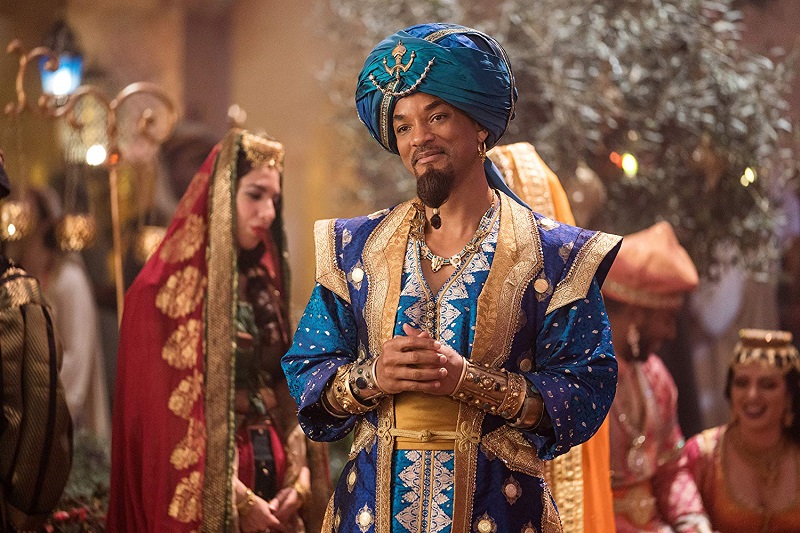
It wasn’t just the off the charts performance of Williams in the original film that would be a difficult bump to overcome for all involved in the live action remake, it’s the chemistry that the late comic genius had with Scott Weinger’s Aladdin that made it work so well and has helped it remain pertinent for almost 30 years. Ritchie scored hugely because in his Aladdin one could argue that the kinetic spark between Smith and Massoud far exceeds the onscreen electricity of the 1992 film between the lead and his genie. They are priceless together and so too are Massoud and Scott.
The love story at the heart of Aladdin is in good hands in the remake. The viewer not only is pulling for these two to overcome their differences, and every other thing that keeps them from being a happy couple, but is firmly engaged by another layer to the richness of the story that wasn’t as present in the 1992 flick. Jasmine has seen her father lead with compassion and a never-ending desire to elevate the lives of his subjects. She wants to do the same and take it even further. Thing is, there has never been a female Sultan in history. Something tells me that never, its days are numbered.
One could argue that if the 1992 version of Aladdin was released today, it would be accused of joining a long list of productions that have “whitewashed” the reality of what is portrayed on screen. They wouldn’t be wrong. With Ritchie’s incarnation of the classic tale, it is so heartwarming (and long overdue) to see not only so many of the names connected to this tale be of Middle Eastern dissent, but also the fact that the production designer and those charged with penning the script were well versed in the minute details that make up an Arabian kingdom, city and folks who inhabit this world. That’s right, a whole team of cultural advisers were employed and their influence on the entire project is felt on every single frame.
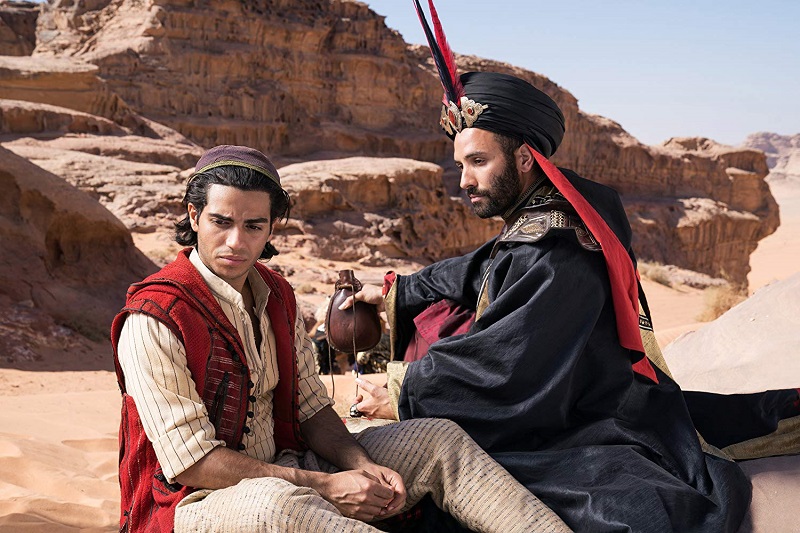
Many of the songs from the first film are updated for the live action remake, but it is the new track that will truly knock viewers out of their seats. Speechless is sang by Jasmine and its lyrics paint a picture of an aspiring royal who is worldly, intelligent and not some passive princess living to fulfill the passions of her prince. This song embodies Jasmine 2019 in such a way that it would be an honor to have my young daughter’s first exposure to the world of Aladdin be this one as it is more likely to inspire, enlighten and lift up her aspirations exponentially more so than anyone who witnessed the 1992 flick.
Whereas Massoud is heavenly handsome, versatile and possesses a voice that reaches for the cheap seats with its power, Scott is equally as stunning, smart and her voice permeates through to the upper raptors in a manner that is truly the embodiment of heaven on earth. Together, they make beautiful music and everything that entails.
Ritchie’s world has expanded with his latest work and it will be fascinating to see how his filmmaking tendencies will be altered (if at all) by his experience working in the musical realm and for Disney. He has delivered a product that befits what the aspirations were when this thing was first considered. Aladdin pops off the screen. It is littered with a litany of colors and hues that run the gamut. I saw it on an IMAX screen and cannot recommend witnessing it in that format enough. Something this beautiful needs the widest palette to appreciate the artist’s brush strokes.
The issue that holds me back from an all out bear hug of this movie is I question its need to even exist in the first place. People talk (and it never seems to happen, judging by box office numbers) about whether audiences are getting or will get superhero fatigue. I’m curious if I (and others like me) am suffering from Disney live action remake fatigue. We just had Dumbo and before the Aladdin showing there was a trailer for Jon Favreau’s The Lion King. That’s three live action remakes within one calendar year. Heck, a half a calendar year! I can see why Disney is doing it, artistically and financially. The latter, I’m sure, is that these remakes are money printing machines. The former, I’m not so sure of the merit other than a societal adjustment to dated material.
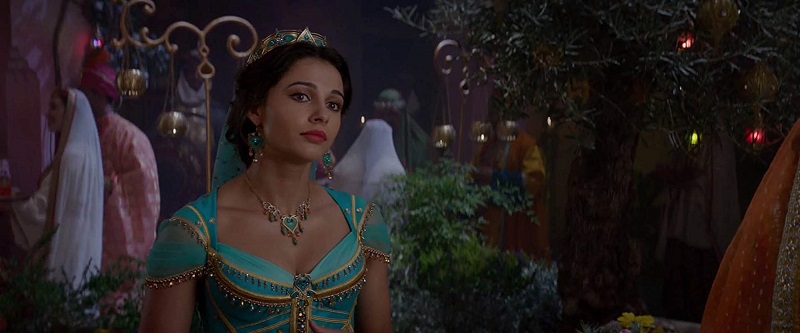
For example, Kenneth Branagh’s Cinderella updated the title character in a way that made her empowered and had her getting her royal romance on her terms. The same could be argued for how Jasmine is portrayed, circa 2019 versus 1992. But I still recall Dumbo and it was good, but not great. And now we have Aladdin and it all just feels a little too crowded and unnecessary. Was there a need for a new Aladdin? Not really. Did I enjoy the experience? Yes, absolutely.
It’s just that my enthusiasm is not as off the charts as it is for something like Booksmart—a whip-smart, completely original film that has a debut director (Olivia Wilde) illustrating how nice it is to have a fresh voice in the movie world instead of re-treading on a traffic jam of classics remade for a new generation.
Film Grade: B

